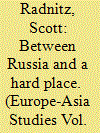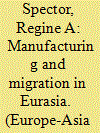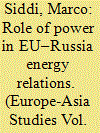| Srl | Item |
| 1 |
ID:
163416


|
|
|
|
|
| Summary/Abstract |
This essay asks how Central Asian states have responded to Russia’s intervention in Ukraine and salvos against the West, as a means to assess how Russia and the Central Asian states understand their national interests and exercise state power. It argues that the post-Soviet region shares a cynical and geopolitically driven view of the exercise of global power. Yet Russia has sometimes deployed its resources to advance short-term ideological objectives, whereas Central Asian foreign policy is pragmatic and opportunistic. The Ukraine crisis threatened to coerce the Central Asian states into conformity with Russia’s interests; ironically, their dependence on Russia has enabled their freedom of action in foreign policy, within limits. The essay highlights the ways that geography enables and constrains the execution of foreign policy, and considers the ambiguous role ideology plays in the formulation of national interests and the prospects for international cooperation.
|
|
|
|
|
|
|
|
|
|
|
|
|
|
|
|
| 2 |
ID:
163423


|
|
|
|
|
| Summary/Abstract |
This article investigates EU–China dialogue on regional policy, a puzzling exercise in policy transfer because such policy is by its nature inward-oriented and the intricacies of regional development imply uncertainty about its effects in different contexts. The article sheds light on the reasons of both sides for engaging in this unlikely policy learning effort and identifies its actors and mechanisms. It also critically assesses this process, stressing its one-way nature and the active role of the EU as a ‘policy-sender’, in contrast to most policy transfer literature citing demands by the policy-recipient as the predominant reason to engage in such cooperation.
|
|
|
|
|
|
|
|
|
|
|
|
|
|
|
|
| 3 |
ID:
163413


|
|
|
| 4 |
ID:
163415


|
|
|
|
|
| Summary/Abstract |
The European Union (EU) and Azerbaijan have negotiated three different agreements for a new legal basis underpinning their relationship since 2010. Whereas the EU tries to adhere to a more unilateral approach, Azerbaijan wants cooperation to take place on a more inclusive, dialogical, basis. The essay will present a model of ‘bargaining power’ to analyse how the Azerbaijani government has tried to enforce this, and to what degree it has been successful. It finds that the bargaining power model can explain some of the changing power dynamics in EU–Azerbaijan relations, and that these might speak to the broader Eurasian region too.
|
|
|
|
|
|
|
|
|
|
|
|
|
|
|
|
| 5 |
ID:
163417


|
|
|
|
|
| Summary/Abstract |
Russian foreign policy thinkers have used a succession of geopolitical imaginaries to articulate a Russian role and identity in the post-Cold War era. This essay analyses one such spatial project, the idea of ‘Greater Eurasia’, which imagines a new geopolitical geometry centred on Sino–Russian cooperation. The ‘Greater Eurasia’ discourse provides a new role for Russia in international affairs but also makes far-reaching claims about the nature of the emerging, post-liberal world order. The essay concludes with an analysis of the main challenges to the ‘Greater Eurasia’ project.
|
|
|
|
|
|
|
|
|
|
|
|
|
|
|
|
| 6 |
ID:
163422


|
|
|
|
|
| Summary/Abstract |
This article investigates the social foundations of apparel manufacturing in Kyrgyzstan. Drawing upon interviews and a survey of Bishkek-based workshop owners, a bottom-up analysis finds that many are family businesses that started producing clothing after the country’s independence in 1991. I discuss here how they acquired the capital and knowledge necessary for this business, and how they mobilised a variety of migration-related experiences and relationships—often related to bazaar work—to compete in the sector. The findings contribute to a growing literature on how migration can facilitate family-based manufacturing in the post-Soviet region, although not without significant costs and challenges.
|
|
|
|
|
|
|
|
|
|
|
|
|
|
|
|
| 7 |
ID:
163421


|
|
|
|
|
| Summary/Abstract |
The crisis in relations between Russia and the European Union (EU) is part of the broader breakdown of the post-Cold War security order. This commentary focuses on structural interpretation and identifies four interlinked processes shaping the crisis: tension between the logic of the enlargement and transformation; a dynamic of involution and resistance; the problem of monism, whereby the expanding self is unable adequately to engage with the un-integrated other; and the recent emergence of ‘other Europes’ that may potentially overcome involution. The erosion of the Atlantic system provides an opportunity for delayed institutional and ideational innovation.
|
|
|
|
|
|
|
|
|
|
|
|
|
|
|
|
| 8 |
ID:
163414


|
|
|
|
|
| Summary/Abstract |
Energy trade is an essential factor in EU–Russia relations. This essay argues that Russia and the European Union have deployed two types of power in their post-Cold War energy relationship. Russia has predominantly exerted geopolitical power through the sale of its vast energy resources and selected strategies to channel them to partners. With a large market but lacking fossil fuels, the EU attempted to achieve its aims mostly through regulatory power. However, both the Russian and the EU external energy policy strategies have recently become more nuanced. This evolution in their approaches has resulted in Russia’s gradual acceptance of the regulatory and market principles promoted by the EU.
|
|
|
|
|
|
|
|
|
|
|
|
|
|
|
|
| 9 |
ID:
163419


|
|
|
|
|
| Summary/Abstract |
The aim of this essay is twofold. First, it seeks to examine how Russia and the European Union understand the emerging Eurasian space. We will do this by looking at how the two narrate the space, the use of power and each other. Second, we want to argue that the narratives at the heart of the conceptual and normative maps that guide their actions and behaviour create an essentially ontological security dilemma; that is, behaviour aimed primarily at enhancing confidence in the identity and continuity of a political community threatens the ontological security of other actors.
|
|
|
|
|
|
|
|
|
|
|
|
|
|
|
|